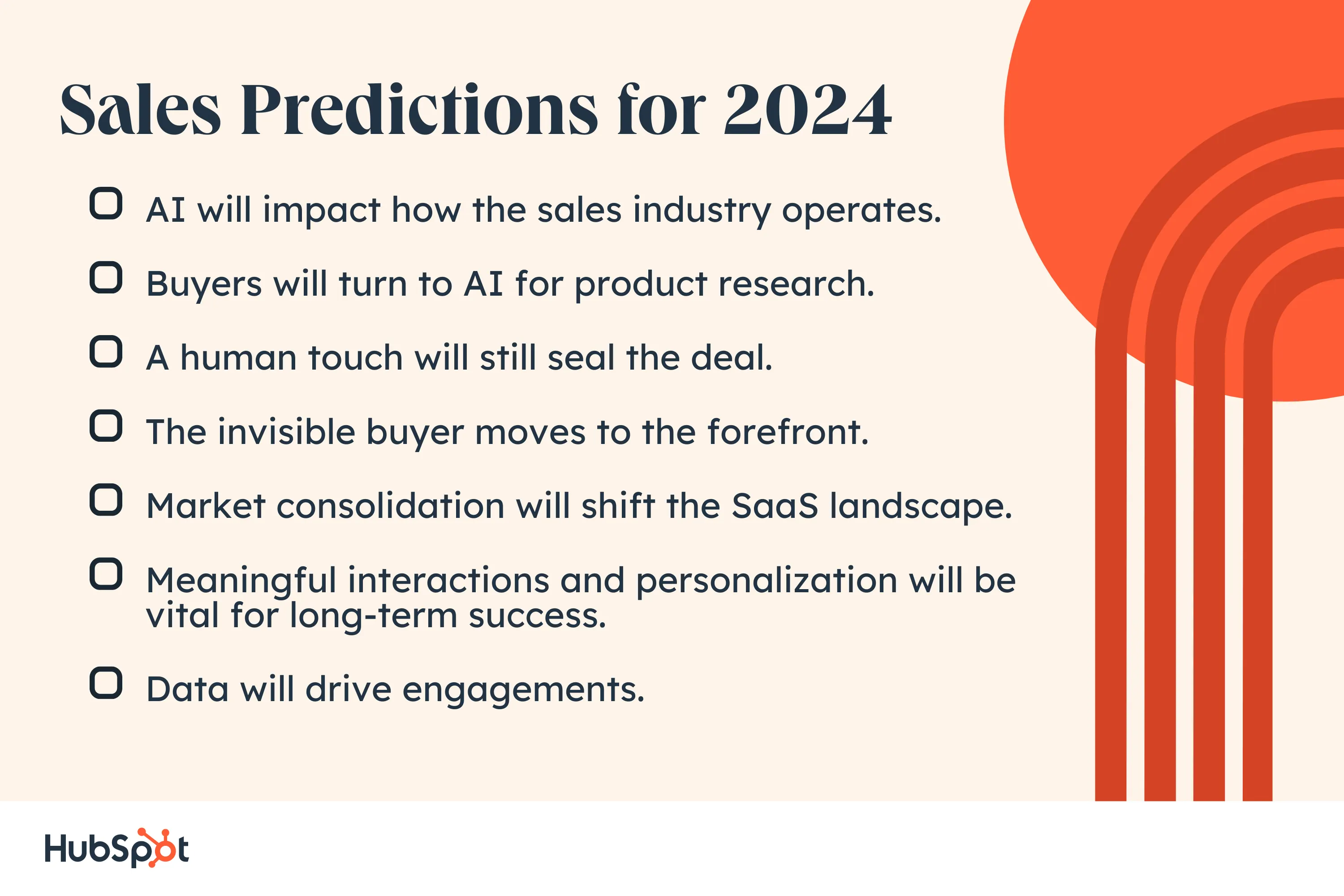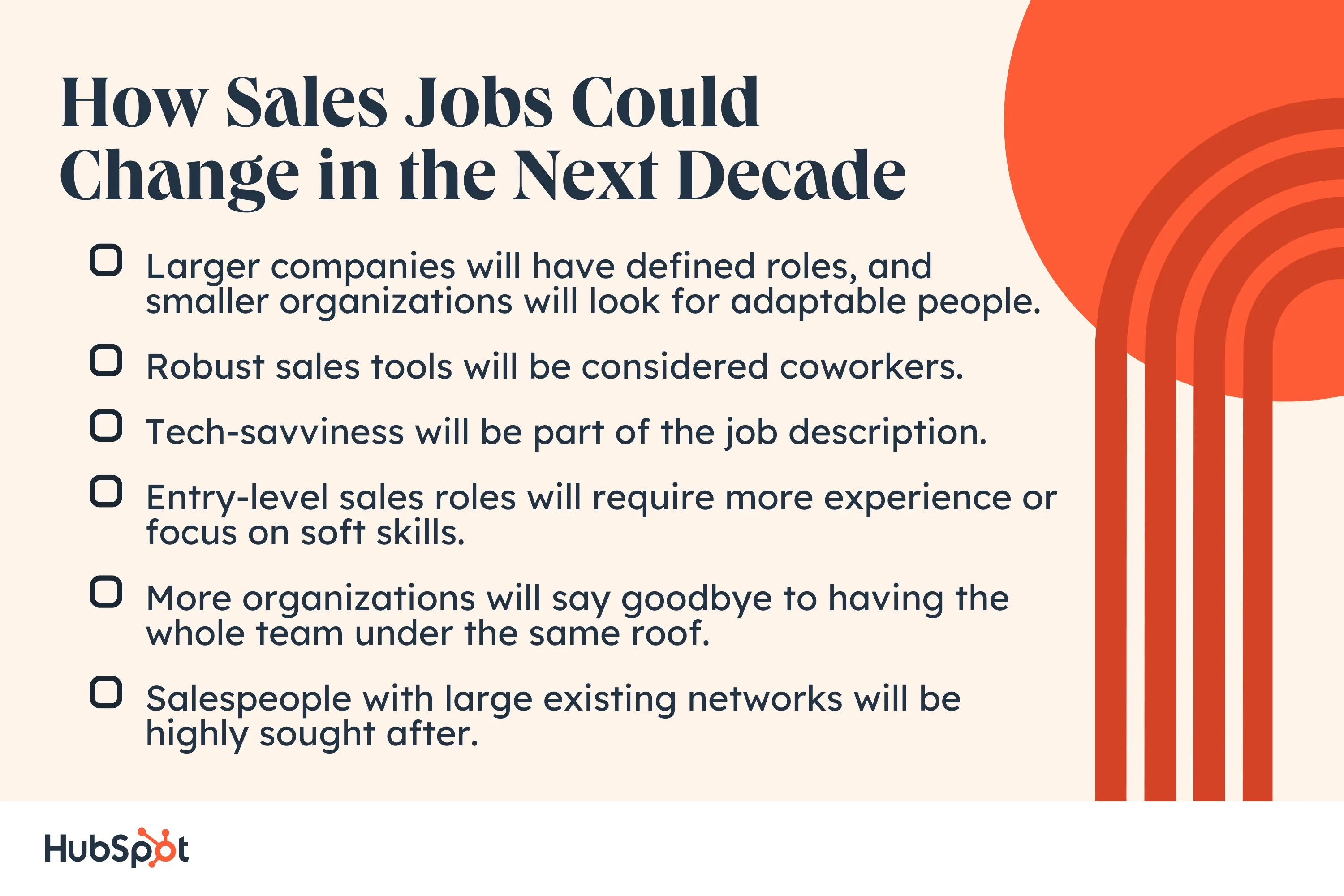As important as it is to stay on top of sales trends for the new year, we also wanted to get expert insight into the top sales predictions for 2024.

Over the next year, how will we begin to see sales evolve? What types of emerging technologies will become commonplace? (Spoiler: it’s AI). How might the job of a sales leader change?
Below, we spoke with four sales leaders to get their sales predictions for the year ahead. Let's dive in.
Table of Contents
7 Sales Predictions for 2024

1. AI will impact how the entire sales industry operates.
According to HubSpot’s 2023 Sales Trends survey, 71% of sales reps agree that AI will have a significant impact on the way buyers research products and services.
Lauren Kiefer, head of sales, Americas at Intercom, believes sales reps must adapt quickly as more buyers are becoming reliant on AI.
“Sellers are going to have to deeply understand AI, the new buying process, and how their product is described by these tools to customize their pitch, cut off objections at the jump, and help prospects to understand your value and offering on a deeper level,” she suggests.
She also recommends forming a strong partnership between sales and marketing to help manage the information AI gathers about your product or service.
And she’s not alone in that thought: 25% of sales professionals believe improving sales/marketing alignment would result in the most growth for their company, according to our survey.
2. Buyers will turn to AI for product research.
65% of sales reps believe generative AI tools will make it easier for buyers to gather information about their products or services. Additionally, 69% believe if buyers use AI for research, it will have a significant impact on the way they sell to prospects.
It’s key to understand both how consumers are using AI and how sales teams can use AI to complement and enhance the consumer experience, according to Ashley Hansen Grech, chief revenue officer at Xero.
“It pays to be AI-optimized,” Grech says. “With an overwhelming volume of products and services available digitally, AI-enabled experiences will mean quicker and more accurate decision-making for customers, based on their inputs.”
Rather than solely focus on how AI will impact you as a sales rep, step into your buyer’s shoes to understand how they are using AI during the sales process, specifically for research.
Grech suggests thinking like your customer.
“How are consumers using AI tools going to discover what you’re selling?” she states. “How will you use AI in your business to help you improve efficiency and make the right decisions? For example, AI programs can analyze your entire sales funnel and help create bespoke experiences for customers along the way so the right information is provided at the right time.”
3. A human touch will still seal the deal.
While AI will play a significant role in the sales process, specifically for product research, a human touch is still the key to closing a sale.
31% of B2B sales reps agree that setting up a face-to-face meeting is still the most effective strategy for selling to new customers.
“Sales professionals remain crucial to the customer sales flow,” says Grech. “AI’s analysis of the customer journey can help sales professionals to do what they do best — to bring a deft human touch to connect with customers and prospects at the right time, with the right information in the right way.”
She adds, “AI [tools] allow salespeople to be human — to really collect on relevant topics, at a relevant time, enabling them to spend their time more effectively.”
Sales reps must continue to hone sales skills like relationship-building and closing techniques to offer prospects the empathy and understanding that AI lacks.
4. The invisible buyer moves to the forefront.
Mark Tanner, co-founder and COO of Qwilr, believes that CFOs, IT, and security teams have immense power in the buying journey. To succeed in the year ahead, Tanner suggests sales reps will need to proactively identify these invisible buyers, address their concerns, and equip champions to push for a yes.
“Selling in 2023 became incredibly hard,” says Tanner. “One of the reasons is due to the invisible decision-makers like the CFO, security teams, and IT all pushing back on new purchases.”
HubSpot’s sales trends data also points to this shift. 33% of B2B sales reps agree that the number of decision-makers involved in the sales process increased in 2023. Not to mention, 28% of reps say that the biggest reason a prospect backs out of a deal is because they weren’t able to get approval from key decision-makers, adding more friction to the process.
To engage a range of decision-makers, Tanner recommends identifying those key players and creating dynamic proposals that not only stand out but make the champion look good to everyone involved.
“Sales material and proposals must account for the invisible decision-makers and prepare champions for the internal sell,” he recommends. “Behind the scenes, sellers need to identify hidden decision-makers, understand whether there is true interest in a deal, and ruthlessly prioritize. In this age, it’s critical that reps spend their time and energy wisely.”
5. Market consolidation will shift the SaaS landscape.
Help Scout's Director of Sales, Zainab Allawala believes that in the coming years, the SaaS landscape is going to be more competitive than ever before.
“Customers are demanding more features, better service, and greater innovation at a lower cost,” says Allawala. “Instead of companies trying to meet the increasing demands of customers through in-house efforts that are costly and resource-consuming, I predict we’ll see more consolidation across the market with companies filling in gaps through mergers and acquisitions.”
Allawala has seen this exact shift play out within her own organization. “To bolster our AI offering quickly, Help Scout recently acquired Support Agent AI,” she says. “I expect to see many more startup acquisitions in 2024.”
6. Meaningful interactions and personalization will be vital for long-term success.
HubSpot’s Sales Trends survey revealed that 24% of sales professionals believe providing prospects and customers with a highly personalized experience would result in the most growth for their company.
"Customer outreach, discovery, and selling within SaaS morphed last year from strategic to desperate while dealing with the slowdown in tech buying and new product procurement,” recalls Kiefer.
She continues, “Because of that, sellers got into the behavior of pushing bundles or one-size-fits-all solutions to try to get as much juice out of the squeeze. Buyers [now] have pressure fatigue and are desperate for a personalized and custom experience that fits their needs in today's market.”
Kiefer suggests the best thing sales reps can do is to spend time on discovery. Focus on uncovering the pain their buyer is experiencing and tailor your pitch and demo to solve that exact pain point.
She also suggests creating powerful efficiencies and ROI that align with what each customer values individually.
“This creates immediate buy-in and allows a prospect to see what impact purchasing could have on their broader teams, which will lead to a faster close and, hopefully, a healthy long-term partnership," she says.
7. Data will drive engagements.
20% of sales reps believe that tracking and organizing data with a CRM had the greatest impact on their role last year, according to HubSpot’s sales trends survey.
As we head into a new selling year, data will continue to play a critical role in the way sales reps engage with prospects.
“In 2024, reps will become mini data analysts, using tools to guide them on which deals are hot and which ones are not,” suggests Tanner. “They’ll make decisions based on buyer engagement that goes beyond whether a prospect directly responds. Think Google Analytics but for sellers.”
How Sales Jobs Could Change in the Next Decade
As some of these trends are shifting, here's how we think sales jobs could change over the next several years.

1. Larger companies will have defined roles, and smaller organizations will look for adaptable people to perform multiple functions.
As effective selling begins earlier in the sales process and the relationship continues after the sales, adaptability will be increasingly important in the sales role.
Smaller companies will rely on multi-talented people for account management and customer success, so the lines may become blurred. Larger organizations, however, may break this up into multiple roles but still value cross-functional talent.
2. Robust sales tools will be considered coworkers.
With reliance on AI and cross-functional teams increasing, so too does the need for elegant sales software solutions that enable reps to make data-driven decisions and/or improve productivity.
In fact, sales management, sales productivity, and sales prospecting tools are the top tools sales reps leverage, according to HubSpot’s Sales Trends survey.
The more sales tools that are needed (or the more elegant the solution), the more the company will invest in them, money-wise and time-wise. These solutions will be integrated into every facet of the sales process and beyond.
3. Tech-savviness will be part of the job description.
Reliance on email, tech, and now AI is already making tech skills more important in the world of sales. Familiarity with the most popular CRMs, comfortability with email communication and automation, and the ability to navigate the internet, social platforms, and generative AI tools are examples of skills that are necessary now more than ever. As technology advances, so too will the tech requirements for sales hires.
4. Entry-level sales roles will require more experience or focus on soft skills.
As some of the more manual and less strategic tasks of sales (such as prospecting and following up) can be automated out effectively, entry-level sales roles that previously spent a lot of time performing these tasks will need to evolve.
It's possible that the “entry-level” gets bumped up to require more experience. Alternatively, organizations may evaluate reps based on softer skills, such as writing, to get more out of new hires.
5. More organizations will say goodbye to having the whole team under the same roof.
With SaaS and other solutions emerging, more companies are targeting national or even international pools of customers. This, combined with the need for more experienced sales reps, the need for more diverse teams, and inside sales trends, demonstrates a continuing shift toward remote work.
61% of sales reps and managers already follow a hybrid sales method, using a mix of in-person and remote selling.
Changing attitudes toward telecommuting and technology, making it even easier to connect with team members, will result in more integrated but geographically distant sales departments. And talent will be more accessible.
6. Salespeople with large existing networks will be highly sought after.
With marketing doing a lot of legwork to fill pipelines, additional prospecting being automated more and more, and a rise in self-serve purchasing, the value that sales professionals add will be in their ability to forge strong relationships and build trust. That puts candidates with existing networks at an advantage with proof of their adeptness at making connections.
Whatever the future of sales is, it's never been a more exciting time for the profession. By having the experts look at where sales has been and where it’s likely going, it’s clear to see the future leaves plenty of room for innovation, education, and kick-ass salespeople.
Editor's note: This post was originally published in May 2018 and has been updated for comprehensiveness.
![Download Now: 2024 Sales Trends Report [New Data]](https://no-cache.hubspot.com/cta/default/53/9cdc68ed-d735-4161-8fea-0de2bab95cef.png)


.jpg)

.jpg)
.jpg)
.jpg)

.jpg)
